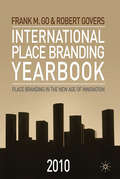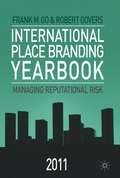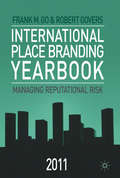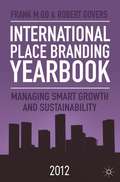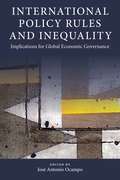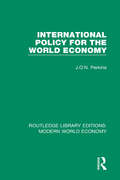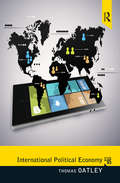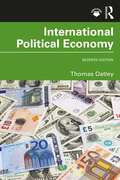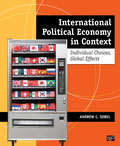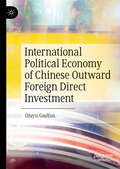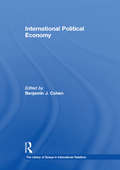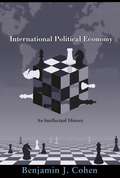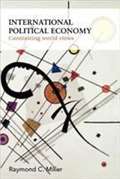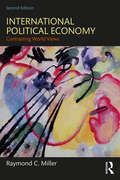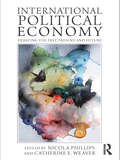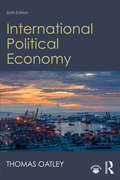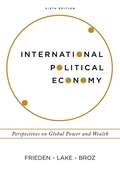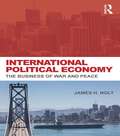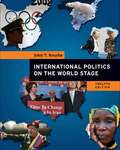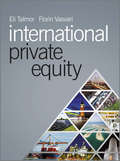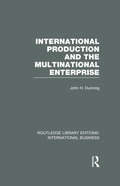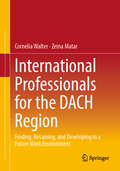- Table View
- List View
International Place Branding Yearbook 2010: Place Branding in the New Age of Innovation
by F. Go R. GoversThe Place Branding Yearbook 2010 examines the case for applying brand and marketing strategies and tactics to the economic, social, political and cultural development of places such as communities, villages, towns, cities, regions, countries, academic institutions and other locations to help them compete in the global, national and local markets.
International Place Branding Yearbook 2011
by Frank M. Go Robert GoversThe second annual volume of the International Place Branding Yearbook; this collection looks at the case for applying brand and marketing strategies andto the economic, social, political and cultural development of cities, towns and regions around the world to help them compete in the global, national and local markets. "
International Place Branding Yearbook 2011: Managing Reputational Risk
by Frank M. Go Robert GoversThe second annual volume of the International Place Branding Yearbook; this collection looks at the case for applying brand and marketing strategies and to the economic, social, political and cultural development of cities, towns and regions around the world to help them compete in the global, national and local markets.
International Place Branding Yearbook 2012
by Frank M. Go Robert GoversThis third annual volume of the International Place Branding Yearbook looks at the case for applying brand and marketing strategies to the economic, social, political and cultural development of cities, towns and regions around the world to help them compete in the global, national and local markets. It focuses on sustainability and smart growth.
International Policy Rules and Inequality: Implications for Global Economic Governance (Initiative for Policy Dialogue at Columbia: Challenges in Development and Globalization)
by José Antonio OcampoOver the past decades, the world has seen a dramatic increase in inequality. To what extent have the rules that govern the global economy, formally or informally, affected this trend? How can global governance arrangements be reformed to counteract them?In this book, an interdisciplinary group of prominent scholars scrutinizes how the rules of global economic governance—or the lack thereof—determine the extent and growth of inequality. Economists, political scientists, lawyers, and other experienced contributors bring together cutting-edge research on global rule making and inequality, exploring how international rules can exacerbate inequalities among and within countries to show the crucial interactions between policy choices and the distribution of income and wealth. They provide an in-depth examination of the rules governing foreign-investment protection, cross-border financial flows, and intellectual property rights, as well as the lack of standards governing international taxation and the channels through which they might affect inequality. With a focus on ambitious and achievable reforms, this book offers concrete steps toward global economic governance capable of counteracting inequitable wealth distribution and bringing about fairer economic growth.
International Policy for the World Economy (Routledge Library Editions: Modern World Economy)
by J. O. PerkinsOriginally published in 1969. This study presents as a whole an outline of the underlying issues of inter-related areas of economic policy in which countries co-operate. Written in an important time of policy reforms following international monetary crises it draws together information on areas of international economic policy that are essential for world trade, the flow of capital and economic health of the world economy but which were often considered separately. It lays emphasis on the ways in which policies from different fields interact with one another, considering economic liberalization and monetary aid among other things, and makes suggestions for policy-makers for successful international economic co-operation.
International Political Economy
by Thomas OatleyBroadly viewing the global economy as a political competition that produces winners and losers, International Political Economy holistically and accessibly introduces the field of IPE to students with limited background in political theory, history, and economics.This text surveys major interests and institutions and examines how state and non-state actors pursue wealth and power. Emphasizing fundamental economic concepts as well as the interplay between domestic and international politics, International Political Economy not only explains how the global economy works; it also encourages students to think critically about how economic policy is made in the context of globalization.
International Political Economy
by Thomas OatleyBroadly viewing the global economy as a political competition that produces winners and losers, International Political Economy holistically and accessibly introduces the field of IPE to students with limited background in political theory, history, and economics. This text surveys major interests and institutions and examines how state and non-state actors pursue wealth and power. Emphasizing fundamental economic concepts as well as the interplay between domestic and international politics, International Political Economy not only explains how the global economy works, it also encourages students to think critically about how economic policy is made in the context of globalization. New to the Seventh Edition Includes the disruptive impact of the pandemic on the global economy Includes discussion of climate change, the Green New Deal, and Green Industrial Policy Extended discussion of the impact of great power competition on the global economy and the role weaponized interdependence might play in this competition Considers the impact that Russia’s invasion of Ukraine will have on globalization Introduces full color format
International Political Economy in Context: Individual Choices, Global Effects
by Andrew C. SobelAlthough many international political economy texts offer good descriptions of what events have occurred in global economic and political relations, they make little attempt to develop explicit theoretical frameworks explaining why. Andrew Sobel′s International Political Economy in Context: Individual Choices, Global Effects takes a micro approach to international political economy that considers the fact that individuals—not nations—make choices. Grounding policy choices in the competitive environs of domestic politics and decision-making processes, Sobel illustrates how policymakers choose among alternatives, settling on those that are most in sync with their self-interest. The book is structured to build students′ skills for a sophisticated understanding of how and why events unfold in the international political economy. Students become versed in the primary assumptions and structural/macro conditions of economic and political geography in the global arena. An examination of micro-level conditions and mechanisms introduces the factors that influence political and economic outcomes. Students are then able to use those primary assumptions and micro-level arrangements to make sense of past and present changes in the global political economy. Those familiar with Sobel′s first volume, Political Economy and Global Affairs, will easily find their way through this new book. Anyone looking for a compelling, accessible, and fully integrated rational choice perspective on international political economy will find it here.
International Political Economy of Chinese Outward Foreign Direct Investment
by Qiuyu GaoYanThis book centers on the political economy behind the internationalization of Chinese multinational enterprises (MNEs). Special attention has been given to the role of political-sided considerations and state policies in their investment strategies during the &“stable period&” (2006 to 2017) when Chinese Outward Foreign Direct Investment (OFDI) witnessed substantial growth, even as the entire world was relatively friendly towards Chinese MNEs. The author uses scientific methods to develop Country Political Risk Index (CPRI)—the first composite index that captures how Chinese MNEs perceive political risk in host countries when making investment decisions, applies it to China Global Investment Tracker (CGIT) dataset developed by American Enterprise Institute (AEI) and interprets the reasons behind the political risk distribution of Chinese OFDI from the standpoint of China&’s holistic approach to national security. Offering by a young scholar with practical experience in business consultancy and M&A projects, this book can help researchers, diplomats and business people better understand how China&’s FDI-related policies empowered Chinese MNEs to venture overseas and emboldened them in the face of unstable investment environments.
International Political Economy: A Reader
by Tsuneo Akaha Kendall W. Stiles"International Policy Economy: A Reader" presents discussions of economic policy issues most frequently addressed by International Policy Economy (IPE) analysts and policy makers: trade, finance, investment, and aid. These policy concerns need to be understood against the backdrop of broad global trends such as changing international leadership patterns, structural changes in the world economy, increasingly crucial relationships between economics and national and international security, and international order.
International Political Economy: An Intellectual History (The Library of Essays in International Relations)
by Benjamin J. CohenPrior to the 1970s, few serious efforts were made to bridge the gap between economics and political science in the study of international relations. Systematic scholarly analysis of International Political Economy (IPE), emphasizing formal integration of elements of orthodox market and political analysis, is really of very recent origin. This volume brings together some of the most important research papers published in the modern field of IPE since its birth less than four decades ago, emphasizing work that has significantly advanced theoretical and analytical understandings. Coverage includes grand questions of systemic transformation and system governance as well as more narrowly focused explorations of the two most central issue-areas of the world economy, trade and money and finance. The introductory essay locates this selection of articles in the context of the field's broad evolution and development to date.
International Political Economy: An Intellectual History (The\library Of Essays In International Relations Ser.)
by Benjamin J. CohenThe field of international political economy gained prominence in the early 1970s--when the Arab oil embargo and other crises ended the postwar era of virtually unhindered economic growth in the United States and Europe--and today is an essential part of both political science and economics. This book offers the first comprehensive examination of this important field's development, the contrasting worldviews of its American and British schools, and the different ways scholars have sought to meet the challenges posed by an ever more complex and interdependent world economy. Benjamin Cohen explains the critical role played by the early "intellectual entrepreneurs," a generation of pioneering scholars determined to bridge the gap between international economics and international politics. Among them were brilliant thinkers like Robert Keohane, Susan Strange, and others whose legacies endure to the present day. Cohen shows how their personalities and the historical contexts in which they worked influenced how the field evolved. He examines the distinctly different insights of the American and British schools and addresses issues that have been central to the field's development, including systemic transformation, system governance, and the place of the sovereign state in formal analysis. The definitive intellectual history of international political economy, this book is the ideal volume for IPE scholars and those interested in learning more about the field.
International Political Economy: Contrasting World Views
by Raymond C. MillerAn essential read on international political economy, global governance and international economics, this book provides illustrative case studies, classical and contemporary debates with historical and theoretical explanation.
International Political Economy: Contrasting World Views
by Raymond C. MillerThe second edition of International Political Economy continues to be the perfect short introduction to the fundamental theories and issues of international political economy (IPE). Written in a concise, accessible style by an experienced teacher and scholar, it combines theoretical perspectives, real-world examples, and comparative policy analysis. The text offers students an in-depth, balanced understanding of the contrasting core perspectives in IPE, allowing them to critically evaluate and independently analyze major political-economic events. Having emerged from both the classical and modern schools of political economy, the book’s unique structure is organized around the threefold world view classification of IPE that the author labels as free-market, institutionalist, and Marxist. The book: Compares, contrasts, and critiques the different approaches in the context of major global issues such as financial crises, free vs. fair trade, ecological degradation, growing inequality, gender, globalization, and multinational corporations; Explains key economic concepts such as financial markets, banking systems, monetary policy, foreign exchange, Keynesian economics, fiscal policy, comparative advantage, value theory, money, role of corporations, and ecological economics as well as their relationship to political concepts such as international regimes and governance; Contains 30 original figures and tables, review questions at the end of each chapter, and a detailed glossary to enhance student learning; Responds to the call from eminent IPE specialists Robert Keohane and Benjamin Cohen for textbooks that take a pluralistic approach. This thoroughly updated second edition is essential reading for students of international political economy, economics, political science and global governance.
International Political Economy: Debating the Past, Present and Future
by Nicola PhillipsThe book gathers together a set of lively, provocative essays by leading voices in International Political Economy to debate the evolution of the field, its current state and its future directions. Prompted by recent commentaries on the existence of a ‘transatlantic divide’ in IPE between an ‘American school’ and a ‘British school’, the essays provide a wide-ranging discussion of whether it is useful to think of the field in these terms, what the ‘American’ and ‘British’ schools look like, what their achievements and shortcomings are, and what are the desirable future directions for IPE scholarship. The diverse responses to these questions reflect the ongoing vibrancy and diversity of the field of IPE, and open up an imaginative and engaging discussion about where we need to go from here. Featuring contributions from the most influential scholars in the field from North America, Canada and the UK, this book is essential reading for anyone interested in the cutting edge debates in contemporary international political economy.
International Political Economy: Interests And Institutions In The Global Economy
by Thomas OatleyBroadly viewing the global economy as a political competition that produces winners and losers, International Political Economy holistically and accessibly introduces the field of IPE to students with limited background in political theory, history, and economics. This text surveys major interests and institutions and examines how state and non-state actors pursue wealth and power. Emphasizing fundamental economic concepts as well as the interplay between domestic and international politics, International Political Economy not only explains how the global economy works; it also encourages students to think critically about how economic policy is made in the context of globalization. New to the 6th Edition Covers economic impacts of 2016 electoral events including new Trump administration initiatives related to TPP and NAFTA; UK and Brexit, and the European populist wave. Examines the global financial crisis, EU debt crisis, capital inflows, and development failures. Probes the death of the Doha Round and explores individual trade preferences, WTO dispute settlement, and other trade-related policies and proposals. Considers the question of the Chinese Renminbi as a global currency to displace the dollar.
International Political Economy: Perspectives On Global Power And Wealth
by Jeffry A. Frieden David A. Lake J. Lawrence BrozWith 70 percent new readings, the Sixth Edition of International Political Economy has been extensively updated to reflect changes in the scholarship and the global economy. This compact book brings together a flexible and provocative set of articles and excerpts on a broad range of topics, including the global economic crisis, international migration, and the ongoing challenges in the Eurozone. The text also provides clear introductions and headnotes to help students get the most out of each reading.
International Political Economy: The Business of War and Peace
by James H. NoltThis book offers a completely new and unique introduction to the economics of international relations. It treats all the traditional major themes of international relations theory while giving each a refreshing new twist with the incorporation of the influence of private power, particularly in the realm of war and peace. It reframes the history of the modern global economy and politics by thoroughly purging the myth of the market, a systematic blindness to private power. It not only draws on, but also illuminates major themes and empirical findings of comparative politics, business history, business strategy, business cycle theory, social evolutionary theory as well as the practical wisdom of traders and investors. Part one introduces the major concepts of competing theories of international relations, emphasizing a unique approach, corporatism. Part two introduces the critical importance dynamic and oppositional analysis of issues. Part three traces the rise of the modern world from the mercantilist period until the rise of modern corporate organizations and the demise of imperialism in the crucible of World War I. Part four begins with the origins of the contemporary dominance of business internationalism before and during World War II, then analyzes three major facets of the postwar era: the unification of much of Europe, the industrialization of the Third World, and the Cold War and its aftermath. The final chapter considers the present and future of a fairly peaceful yet economically unstable world. This book presents a refreshing and exciting portrayal of the global economy which challenges every major subject from money to markets to the business cycle. This book eschews the economics of dull averages to restore the drama of contending business forces, struggling for wealth and, in the process, influencing war and peace.
International Politics On The World Stage
by John T. RourkeOne of the leading texts on the IR market, John Rourke's International Politics on the World Stage provides a balanced and comprehensive study of international relations that combines theory, history, and current trends and events. The modern international system, a background history of how it evolved in its present form, as well as transformations that are shaping the 21st century are presented in a straightforward, accessible discussion, without undermining the complexity of world political issues. The text lives up to its reputation of including the latest events and developments of the world stage. Rourke discusses political theory, including contemporary approaches such as constructivism and postmodernism, in the opening chapter. He brings theoretical concepts to life with illustrative examples taken from major current world events, so students see how theory plays out in the real world. The text covers major issues of the twenty-first century, such as the structure of the modern state in the international system, globalisation and the political economy, global security, the rise of intergovernmental and nongovernmental organisations, human rights, and the environment. These topics linked through the chapters in the text give students a grasp of the underlying patterns in world politics, so that they can interpret events they see on the evening news or on the Internet. As in previous editions, the text shows students how politics affects our everyday lives and emphasizes the importance of being politically aware, making informed decisions, and taking responsible action.
International Pricing of Emerging Market Corporate Debt: Does the Corporate Matter?
by Ashoka Mody Sonja KellerA report from the International Monetary Fund.
International Private Equity
by Eli Talmor Florin VasvariBringing a unique joint practitioner and academic perspective to the topic, this is the only available text on private equity truly international in focus. Examples are drawn from Europe the Middle East, Africa and America with major case studies from a wide range of business sectors, from the prestigious collection of the London Business School's Coller Institute of Private Equity. Much more than a simple case book, however, International Private Equity provides a valuable overview of the private equity industry and uses the studies to exemplify all stages of the deal process, and to illustrate such key topics as investing in emerging markets; each chapter guides the reader with an authoritative narrative on the topic treated. Covering all the main aspects of the private equity model, the book includes treatment of fund raising, fund structuring, fund performance measurement, private equity valuation, due diligence, modeling of leveraged buyout transactions, and harvesting of private equity investments.
International Production and the Multinational Enterprise: International Business: International Production And The Multinational Enterprise (rle International Business) (Routledge Library Editions: International Business)
by John H DunningThe growth and impact of the multinational enterprise (MNE) in the post war period is one of the most important phenomena of our time. This volume, originally published in 1981 provides a comprehensive and detailed review of both the theoretical and policy issues at a time when the subject had reached a watershed, after the controversies of the 1970s. The book provides a balanced discussion of major themes such as the development of modern theories of international production; the impact of the MNE on the nation-state and the structure of the international market; the response of governments and the appropriate framework for policy measures; and the historical context and likely future of the MNE.
International Professionals for the DACH Region: Finding, Retaining, and Developing in a Future Work Environment
by Cornelia Walter Zeina MatarThis book presents the necessary resources and practical options for companies to find, bind, and develop international professionals in the DACH region. Through a study conducted by the authors, the interrelationship between Human Resources and internationality is analyzed. The book is organized around the Employee Experience and is suitable for executives, managers, leaders, communication and HR departments, as well as relocation and personnel services.
International Profit Associates
by Thomas J. Delong Ashish Nanda Monica MullickDescribes the work environment, systems, and processes that allow International Profit Associates (IPA) to follow a systematic four-step approach to providing advisory service to small business owners.
